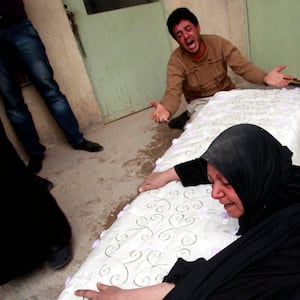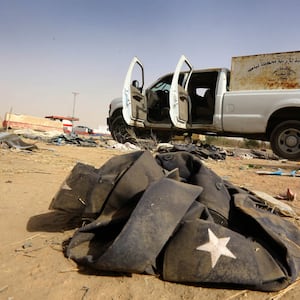The Department of Justice is investigating a military contracting company, Sallyport Global Services, to find out if it played a role in the alleged bribery of Iraqi government officials in exchange for exclusive contracts that cost American taxpayers billions.
But even the Feds may not realize the depth of the suspected corruption.
An investigation by the independent Government Accountability Project for The Daily Beast raises disturbing questions that go far beyond rogue employees of a Pentagon contractor.
Powerful individuals, including Iraq’s former Prime Minister, Nouri al-Maliki, are tied to a Kuwaiti company called Afaq which allegedly sold access and dictated terms for a significant number of American military contracts.
The story of Afaq and its ties to American military contractors in Iraq comes from whistleblowers, who spoke out at great personal risk, and we were able to confirm several details through public and corporate documents.
Of the more than 30 sources interviewed, including contractors and people in business in Iraq, all asked to remain anonymous, citing fear of potential retaliation.
“This is top secret,” said one contractor who refused to speak further.
The winding road into this story begins at a Sallyport facility in Iraq.
Sallyport operates military installations throughout the Middle East and Central Asia, but its crown jewel is Balad Air Base, a large F-16 base north of Baghdad.
Balad is an Iraqi base, but it’s funded by the U.S. government.
In January 2014, Sallyport acquired an Air Force contract to provide security, training, and “life support,” which means providing necessities like food and electricity, on base. Sallyport has received $1.1 billion for its work at Balad. It predicts it will earn $800 million more by 2021.
Prior to obtaining the Balad contract, Sallyport made a deal with a company called Afaq Umm Qasr Marine Services. Sallyport sources, including senior employees at Balad and in the company’s Reston, Virginia office, identified Afaq as a “partner.”
Afaq’s alleged activities on behalf of Sallyport caught the Justice Department’s attention, said four sources.
Corporate documents outlined this relationship.
Sallyport is controlled by a holding company called Caliburn International, which is owned by a private equity firm, D.C. Capital Partners.
Until recently, Sallyport was managed by a third D.C. Capital Partners company, Michael Baker International, an engineering and consulting firm. In 2018, Sallyport was transferred to Caliburn to be taken public.
Documents filed with the Securities and Exchange Commission by Caliburn disclose that in October 2016 an Iraq Defense Ministry employee alleged that Afaq promised money to Iraqi government officials in return for these officials naming Sallyport as a service provider at Balad. Since Balad is an Iraqi base, the Iraqi government has input on which contractors are hired to work there. Afaq’s ties to Iraqi government officials were confirmed by 17 sources.
Afaq “smoothed things over with Iraqi officials,” said a former member of Sallyport leadership at Balad.
Afaq is ultimately controlled by al-Maliki, according to 10 sources, some of whom had firsthand knowledge of al-Maliki’s involvement, while other sources’ information was secondhand.
Al-Maliki’s son, Ahmad al-Maliki, and later his son-in-law, Yasser Sukhail al-Maliki, were also involved with Afaq, sources said.
The former prime minister doesn’t micromanage Afaq, sources said, but they allege that he got paid, and that connection worked for Sallyport. When Sallyport officials needed to meet with al-Maliki, Afaq’s management “would set it up,” said the former senior official at Balad.
The Department of Justice is now investigating potential violations of the Foreign Corrupt Practices Act and other U.S. laws arising from Sallyport’s relationship with Afaq. The government’s investigation “considers whether Sallyport’s former management knew, or should have known” about the payments allegedly promised by Afaq “to Iraqi government officials,” said the Caliburn SEC filing.
These former managers are believed to be Michael Baker executives, who according to Caliburn’s filing deny any knowledge of Afaq’s alleged wrongdoing in securing the Iraqi government’s support of Sallyport.
Michael Baker’s former CEO, Kurt Bergman, allegedly made the business deal with Afaq. Michael Baker’s COO, Nick Gross, was allegedly responsible for implementing that deal. We have not been able to learn whether either Bergman or Gross are subjects of the Department of Justice investigation.
Also unknown is whether the Department of Justice investigation could be aiming higher than an engineering firm’s former C-suite staff.
Thomas Campbell, the owner of D.C. Capital Partners, was allegedly briefed on the Afaq deal, a former Sallyport official said.
Gross did not respond to calls and messages and Bergman declined to comment, so we were unable to confirm firsthand details of who else they may have told about deals with Afaq.
But the boards of D.C. Capital Partners and Michael Baker International included powerful people and there are legitimate questions about who knew or should have known about how Afaq obtained the Iraqi government’s blessing for Sallyport’s Balad contract.
Former CIA Director Michael Hayden, former NATO commander Jim Stavridis, former Central Command commander Anthony Zinni, former Deputy Secretary of State Richard Armitage, former CIA General Counsel Jeffrey Smith, former Marine Corps Commandant Michael Hagee, Vice Admiral Stephen Loftus, former Deputy Director of National Intelligence Donald Kerr, and former Ambassador-at-Large and Coordinator for Counterterrorism Hank Crumpton were D.C. Capital advisory board members at the time the Afaq deal was being negotiated and implemented, according to an archive of the D.C. Capital website. Hayden and Stavridis directed us to D.C. Capital for comment, and none of the other advisory board members responded to questions sent to them by email and mail.
We reached out to Afaq through email, WhatsApp, and Facebook, but no one from the company responded to requests for comment. Afaq employees were told not to speak to us, according to one Sallyport employee with friends at the company.
A special agent investigating the Sallyport/Afaq relationship for the FBI’s International Corruption Squad declined to comment on the investigation and referred us to the agency’s media office, which also declined to comment.
“To this day we continue to fully cooperate with the Department of Justice on this matter,” said Sallyport in response to questions sent to D.C. Capital Partners. The company said it terminated its relationship with Afaq after learning about allegations of Afaq’s relationship with Iraqi government officials.
Today, Afaq is accused by sources of being a key corruption channel; but before the deals with military contractors, it had humble beginnings.
Documents show it began as a subsidiary for a Kuwaiti company, American United Logistics, owned by former U.S. Army logistics officers.
American United managed cargo in Umm Qasr, Iraq’s only deepwater port. By 2007, it had a stranglehold on U.S. Army shipping through the port. “There was almost no competition,” said one American United source. But the company closed down in 2013 because of some serious reputation issues.
American United’s former chief financial officer, Frank Howard, was sentenced to life in prison in Texas after he embezzled tens of millions of dollars from the company, money he used in part to fund a failed attempt to hire a hitman to murder his wife, Nancy. After paying a dozen East Texas methheads roughly $3 million, Howard eventually found one who shot her in the face.
Nancy Howard survived. Frank Howard went to jail. And American United collapsed. Howard “destroyed” American United, said one source familiar with the company. But American United had already been forced out of Iraq before Howard launched his murder-for-hire plot.
The company was driven out by its own subsidiary.
American United relied on Iraqi drivers to discourage insurgent attacks, which often targeted Kuwaiti trucks. To pay drivers, they created Iraqi companies, eventually cobbling one together under a man named Sami al-Asadi, in 2008.
This business was called Afaq, which means horizon in Arabic.
After the U.S. invasion in 2003, Sami was a security guard for a United Nations program and a mechanic, sources familiar with Sami and American United said. He was recruited to American United by a friend. “Sami was nothing at the time,” one source said. But he had connections. “You need connections to move around Iraq and not be shot,” they said.
There were rumors in Umm Qasr that Sami was a member of Muqtada al Sadr’s Mahdi Army, sources said. The Mahdi Army was a Shia militia group that dominated parts of Southern Iraq but disbanded as a militia in 2008 after a losing fight against government forces.
Sami’s work with American United attracted attention from some of his own powerful relatives around late 2009, notably former acting Interior Minister Adnan al-Asadi, believed to be an uncle in the extended family. Adnan al-Asadi did not respond to emailed questions.
The Interior Ministry controls Iraq’s police and border patrol. Adnan al-Asadi is a close ally of al-Maliki and processes “irregular transactions” for him, according to information attributed to an Iraqi ambassador to Lebanon (believed to be Omer Berzinji) in documents leaked by Wikileaks.
Sami, four sources said, is also linked to Essam al-Asadi, the “No. 1 businessman in Iraq, supported by the government.” Another connection is Abdul Ghani al-Asadi, Iraq’s powerful special forces general, who is the father-in-law of an Afaq director, three sources said.
“That part of the family didn’t really care about [Sami’s] part of the family” until he controlled Afaq, one American United source said. Before that, “no one in Baghdad had any interest in him.”
Sami al-Asadi did not respond to emailed questions about Afaq.
“Sami doesn’t even talk to the program managers” of military contracting companies, one source said, explaining that he would never speak to plebeians like us. “He goes straight to talk to the owners.”
But in Afaq’s early days Sami got his hands dirty, sources claim. “Everyone who worked for him was scared” of him, said one source.
By 2010, Sami was out of control and American United was vulnerable. American United “created a monster,” said a source who had done business in Umm Qasr.
American United’s fatal mistake was a careless property deal.
When American United management created Afaq, they also gave Sami control of their Umm Qasr facility, still allegedly filled with U.S. government equipment. “Sami took the land in his name,” said one source. “They did not change the owner’s name for Afaq.”
That gave Sami leverage.
Throughout 2009 and 2010, Afaq’s relationship with American United worsened. Sami tried to steal customers from the parent company, one source said. But American United still needed him. “If you wanted to move cargo, he’s the only guy who's got the power to move that cargo,” said the source.
Then American United got a contract to deliver M-1 Abrams tanks and Sami “jacked up the rates” to ship them, another source said. American United started looking for a cheaper partner and Sami found out.
American United employees thought the problems could be worked out. “It was always a hostile environment,” said one former employee. “He was always threatening to kick us out.”
But this fight was different. In June 2010, Adnan al-Asadi had been promoted to acting interior minister. “His uncle became head of the security force,” said a source.
In early August 2010, Sami moved against American United. Some sources said Afaq tried to prevent rival trucks from leaving Umm Qasr. Others called it a coup.
Afaq took American United’s equipment and forced the company out of the Umm Qasr compound, which was still under Sami’s name, at “gunpoint,” said a military source familiar with the situation.
One American had to be smuggled out of the port and others barely avoided capture by Sami’s men at its gates, sources said.
American United survived one more year, finishing contracts out of a warehouse on the north side of the port, “while trying to develop a plan to get out of Iraq,” a source said. Sami also tried to shut down that warehouse, according to sources.
The end of American United was the beginning for Afaq.
“After the takeover, Afaq sent us one of [American United’s] marketing products,” said the military source. “They changed [American United] to Afaq and announced that they were open for business.”
In another piece of Afaq’s promotional material, the company issued a warning to potential clients: Iraq’s government might close all borders and cut off shipping except through Umm Qasr, presumably to Afaq’s benefit.
“What if?” they asked.
But Sami didn’t find running a shipping business as easy as he might have thought.
Sami got a deal with the shipping company Maersk, a source said, but despite government backing, Afaq floundered. The U.S. military was pulling out of Iraq at the end of 2011, and demand for his services dropped. Plus, Sami had a lot of enemies.
“People don’t like you when you take someone else’s business,” one former American United employee said.
Afaq lost its foothold in Umm Qasr, but Sami found a new outlet. The U.S. military may have left, but they were being replaced with private military contractors. Sami turned to deals with companies like Sallyport.
Sami’s “arrival” was “convenient for his other part of the family” that was connected to the government, said one source.
It’s no surprise Sallyport and Afaq saw each other as natural partners at Balad. They’d done business before.
The earliest deal we discovered, maybe the first deal between Afaq and Sallyport, was in place in 2012.
Sallyport had a contract to provide life support, medical, and security services at another base, Camp Speicher, in Tikrit, Iraq, until it fell to the Islamic State in 2014. Speicher then became the site of one of the Islamic State’s worst war crimes. They massacred 1,700 Shia Iraqi Air Force cadets there.
But before Tikrit fell, Sallyport “was in bed with Afaq,” said a former contractor, something confirmed by several other sources.
“Afaq and Sallyport had a contract in 2012 to run the base in Tikrit,” said a former Sallyport official. It was “under a 50/50 arrangement and they paid out,” meaning Sallyport paid Afaq half their net profit at that base.
At Balad, the deal was messier.
That story begins with a different company, SOS International (SOSi), which, two sources said, is also entangled in a federal investigation of its deals with Afaq at other bases.
SOSi was supposed to win the Balad contract. By May 2013, SOSi believed it was theirs. They announced they beat 22 other companies for a one year contract, worth $84 million, to provide life support, security and logistics at Balad and other sites. The contract began September 2013.
These contracts tend to yield far more than their initial value. Security jobs don’t have fixed end dates; SOSi expected contract renewals worth billions.
SOSi employees spent five months setting up Balad then lost control of the base. Their contract was reduced to a $79 million contract to restore the base’s runways, with no chance for renewal, because, presumably, the runways would only be built once. SOSi missed out on a nearly $2 billion prize.
Sallyport took over.
“The way [Sallyport] came in after the contract had been signed with another company was very odd,” said one contractor who worked for SOSi at Balad. But several Sallyport contractors said SOSi lost the contract due to poor performance. “Sallyport were awarded the Balad contract due to SOSi’s inability to stand up basic life support,” said one employee. Others said that wasn’t the full story.
Afaq influenced the contract, four sources said.
“Afaq made demands,” said one former contractor at Balad. We never learned Afaq’s terms, but that contractor said SOSi didn’t accept them. Whatever it was that Afaq insisted on receiving, “SOSi wouldn’t give it to them.”
Sallyport affiliated sources disputed that SOSi didn’t accept Afaq’s deal. They said SOSi also paid the company. “They couldn’t fulfill the contract,” said one Sallyport source. “No amount of money can change that.”
Either way, Sallyport made a deal with Afaq.
In February 2013, Sallyport signed a memorandum of understanding with Afaq, outlining “terms of future joint cooperation, work sharing, and net-profit sharing in connection with seeking [Air Force] contract awards... at certain Iraqi military air bases,” according to the Caliburn SEC filing.
Then in September, 2013, the same month SOSi began work at Balad, according to Iraqi court documents, Sallyport and Afaq agreed to split profits from Balad 66 percent to 33 percent.
Sallyport’s alliance with Afaq didn’t last. Sami “always overcharged,” said a source from Umm Qasr, who also had knowledge of Afaq’s later deals.
When Sallyport was negotiating with Afaq, Nouri al-Maliki was one of the most powerful men in the country. In September 2014, after the Islamic State swept across Iraq, al-Maliki’s government collapsed.
This was a huge blow to al-Maliki and his family along with the businesses they were backing, including Afaq.
“After the ISIS attack, Maliki fell, so his son didn’t have the relationship,” said one source, who had explained that al-Maliki’s son Ahmad helped manage Afaq. “Sallyport denied them because they didn’t need them.”
The deal with Afaq survived two years after al-Maliki lost the premiership, sources said, while Sallyport’s leadership who negotiated it still worked for the company.
But in 2016, Sallyport stopped making payments to Afaq.
“They told Afaq, fuck off,” a source with knowledge of the breakup said. “Go to court, we don’t care.”
In August 2016, Afaq sued Sallyport in Iraqi courts, first for $70 million, then for $90 million. It lost both cases “on formalities,” but didn’t give up. Afaq appealed one dismissal, and won. An appeals court determined Sallyport owed Afaq over $56 million.
Ultimately, Afaq wasn’t paid, because Sallyport also appealed and won again.
Losing Balad didn’t destroy Afaq.
Today, it is in business with SOSi through an Afaq subsidiary called Shahed al Sharq. They’re partners at two other Iraqi bases, Camp Taji, a rural outpost near Baghdad, and a compound in Besmaya, Iraq, sources said. Specific details about the relationship at Besmaya are unclear, but three sources said Afaq and SOSi had a 50-50 deal at Taji, the same as Sallyport’s deal at Tikrit.
At Taji, Afaq is in charge. They “can fire people from SOSi,” said one source who worked at the base.
SOSi did not respond to requests for comment.
Sallyport’s endgame is different. They’ve held onto Balad and are trying to weather the federal investigation.
Fortunately for the company, that investigation started on Sallyport’s own terms. “Sallyport voluntarily disclosed to the [Department of Justice] a potential violation” of the Foreign Corrupt Practices Act, said the Caliburn filing, “and potentially other U.S. laws.”
Sallyport has told the Department of Justice that its employees claim they were unaware that Afaq was promising alleged bribes that benefitted Sallyport. “Former management that negotiated and reviewed the Afaq MOU [memorandum of understanding] denies any such knowledge” of promises to pay Iraqi officials, said the Caliburn document.
But Sallyport’s victory over Afaq’s lawsuit raises questions about what Sallyport’s employees knew or should have known.
According to the Caliburn document, the Appeals Court of Baghdad dismissed Afaq’s claim due to its “failure to present legal documentary evidence to support its performance.” In other words, the court concluded Afaq couldn’t prove it was doing serious work at Balad. But if Afaq wasn’t working, why did Sallyport take years to break off a contract that entitled the company to a significant portion of Sallyport’s profits?
“It doesn’t make good business sense” to pay Afaq, if they weren’t working, said Shruti Shah, president of the Coalition for Integrity, an anti-corruption organization, after she learned about the arrangement.
There are “a lot of red flags,” Shah said.
Whatever the Justice Department ultimately concludes took place in the case of Sallyport and Afaq, contractors we spoke with viewed bribery as the cost of business in Iraq.
“The issue isn’t nefarious contractors,” said one source. “It’s the U.S. government accepting bad practices.”
Whether or not the U.S. military accepts corruption, contractors doubted the Department of Justice would punish Sallyport.
“The FBI looks at these things for a little while then goes away,” said another former Sallyport official.
Corruption has real consequences.
Last September, a previous Government Accountability Project investigation with The Daily Beast revealed allegations of theft, procurement issues, generator explosions, confiscated passports, issues with an Iranian backed militia, security failures, animal abuse, and rigged security inspections at Balad. We also uncovered a white South African security guard clique promoting apartheid and mistreating minority coworkers.
In response to our first investigation, Sallyport removed its security director at Balad as well as his second in command.
But if the company managing Balad was selected for competence rather than a cozy deal with the prime minister’s company, the base might not have been a disaster in the first place.
The big picture is even worse.
There’s a “recipe for seizing and retaining power in Iraq: absolute command of the military, absolute control of intelligence services, financial dominance,” a former senior Western official, who served several tours in Iraq, told us after we explained Afaq’s story.
Shady payments, our military industry, and ultimately the American government, gave al-Maliki the money to help build what the official described as a “real life ‘deep state.’”
Al-Maliki funded Iranian-backed Shia death squads and sectarianism, plunging his country into violence and prolonging an endless war.
Al-Maliki’s corruption “directly contributed to the rise of ISIS,” said the official.











